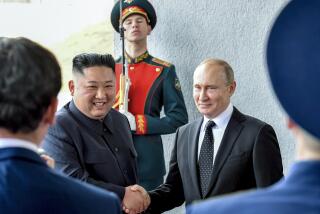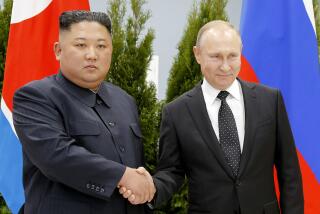Bush Plans to Send Envoy to N. Korea
- Share via
WASHINGTON — The Bush administration eased its almost nonexistent relationship with North Korea forward Wednesday, announcing that it would send an envoy to meet with the Communist nation’s reclusive leadership, for the first such contact between the U.S. and the North in nearly two years.
President Bush disclosed the decision in a telephone call Wednesday morning to President Kim Dae Jung of South Korea, White House Press Secretary Ari Fleischer said.
The dispatch of an envoy, expected to be Assistant Secretary of State James A. Kelly, suggests that the administration has concluded that North Korea is meeting the toughened standards the U.S. has set for new contacts.
Fleischer put at the center of any developing U.S.-North Korean talks an easing of the military tensions that remain 50 years after the end of the Korean War.
He said Bush and Kim “agreed that real progress with the North depends on full resolution of the security issues on the Korean peninsula, including the North’s possession and pursuit of weapons of mass destruction and ballistic missiles.”
Kelly had been scheduled to visit North Korea in July, but the trip was canceled after North and South Korean naval vessels skirmished in the Yellow Sea in June. Talks between the United States and North Korea have been suspended since the Bush administration took office last year.
Since the original mission was put off, North Korea has reached out on economic and diplomatic fronts to Japan, the U.S., Russia and China. Several experts on the politics of the Korean peninsula said the measures Pyongyang has taken were sufficient to draw the increased contact and to overcome objections from hard-liners in the Bush administration.
In recent weeks, North Korean leader Kim Jong Il has confessed that his country kidnapped at least a dozen Japanese to assist its spies--an act the North had denied for decades. He made the admission during a visit to North Korea by Japanese Prime Minister Junichiro Koizumi that many believe will lead to normalization of relations with Japan.
North Korea agreed to permit mine-clearing work along the border with South Korea so that the two nations can connect their rail lines.
Pyongyang also announced the creation of a special economic zone in the city of Sinuiju, on the border with China, and appointed a Chinese businessman to run it. The action has been seen as moving North Korea in the direction of the Chinese economic reforms favored by Washington.
Britain announced Wednesday that it is upgrading its relationship with North Korea by naming its first ambassador to the Communist country.
“It is an encouraging development that the United States will dispatch a high-ranking envoy in the near future,” Kim Ki Man, a spokesman for the South Korean president, said today.
Still, any move toward rapprochement with North Korea could prove awkward for the Bush White House.
“Nothing has changed in the president’s thinking about North Korean President Kim Jong Il and the North Korean leader’s starvation of his own people, the militarization efforts that he’s leading, the
“The Bush administration thinks it has a problem because people will say, ‘How come you’re bashing one arm of the axis of evil and dealing more amicably with another?’ ” said Donald Gregg, U.S. ambassador to South Korea during the previous Bush administration.
But, said Gregg, “to not send an envoy at this point would be unnecessarily stiff-necked. What North Korea is doing is demonstrating very clearly they want to change the way they relate to the outside world.”
*
Times staff writer Barbara Demick in Seoul contributed to this report.
More to Read
Sign up for Essential California
The most important California stories and recommendations in your inbox every morning.
You may occasionally receive promotional content from the Los Angeles Times.













